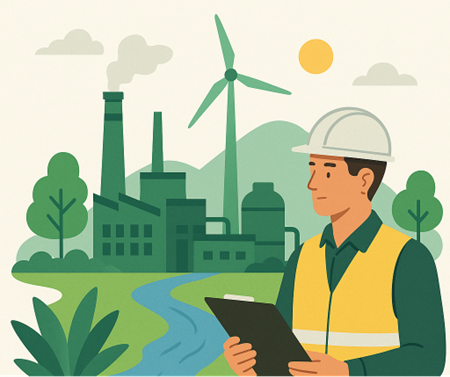Green Industry Push in West Kalimantan: PROPER Program Urges Companies to Go Beyond Compliance
 (Source: AI)
(Source: AI)
A growing call for industries in West Kalimantan to take a more proactive role in environmental and social sustainability has been amplified through the latest outreach of Indonesia’s Program Penilaian Peringkat Kinerja Perusahaan dalam Pengelolaan Lingkungan Hidup (PROPER), or the Corporate Performance Rating Program for Environmental Management. The event, held on July 29, 2025, in Pontianak, was jointly organized by PT Sucofindo (Persero) and the West Kalimantan Provincial Environmental Agency (Dinas Lingkungan Hidup, DLH). It brought together over 120 participants from various industrial sectors — including palm oil mills and mining operations — operating across the province’s expansive 14 million hectares. The primary message was clear: industries must not only meet environmental regulations but also contribute positively to surrounding communities and ecosystems. The emphasis marks a shift from traditional compliance to a more integrated, sustainable business approach, aligning with global expectations for green and responsible industry practices.
From Compliance to Contribution
Speaking at the event, Head of the West Kalimantan DLH, Adi Yani, underscored the evolving role of PROPER as more than a regulatory mechanism. “PROPER is no longer just an administrative formality. It has become a strategic instrument to measure and drive the sustainability of industrial operations,” he said in a press release. With over 134 crude palm oil (CPO) processing plants and hundreds of licensed mining operations, West Kalimantan is one of Indonesia’s most resource-intensive provinces. This makes it a critical focal point for environmental governance. “Our rivers, which are the arteries of life for Kalimantan Barat, are under increasing pressure. Ensuring the industrial sector does not degrade these vital ecosystems requires a collective commitment,” Adi Yani emphasized. He also highlighted the importance of establishing data-driven environmental management systems within companies. “Environmental and social responsibility must be more than a checklist — it must create direct, measurable impact. Achieving a ‘green rating’ is not the end goal; becoming part of the solution is,” he added.
Sucofindo’s Role in Green Industry Development
Ali Ridho, Head of PT Sucofindo (Persero) Pontianak Branch, echoed the sentiment and described the event as a platform for open dialogue and continuous improvement. “Sucofindo is not merely a verification body. We position ourselves as a strategic partner — providing technical guidance and capacity building to help industries evolve toward sustainable practices,” he said. Sucofindo’s support includes laboratory testing, environmental training, compliance audits, and efficiency assessments. These services are designed to help companies not only understand where they stand but also identify pathways for improvement and innovation in environmental performance. “Our mission is to assist industries in generating positive, lasting impacts on the environment. We want to see green industry not as an ideal, but as the new standard,” Ali added.
Toward a Greener Industrial Future
The event marked a significant push for industries in West Kalimantan to transition into green industry models — characterized by cleaner production processes, transparent reporting, renewable resource use, and active community engagement. The shift toward green industry is increasingly recognized not only as a moral imperative but also as a business strategy. With global markets and consumers demanding greater corporate responsibility, companies in Indonesia’s resource-rich provinces have an opportunity to lead by example. Through programs like PROPER, supported by institutions such as Sucofindo and backed by government agencies, the groundwork is being laid for a more sustainable industrial ecosystem — one where growth and environmental stewardship go hand in hand.
Reference:




Comments :